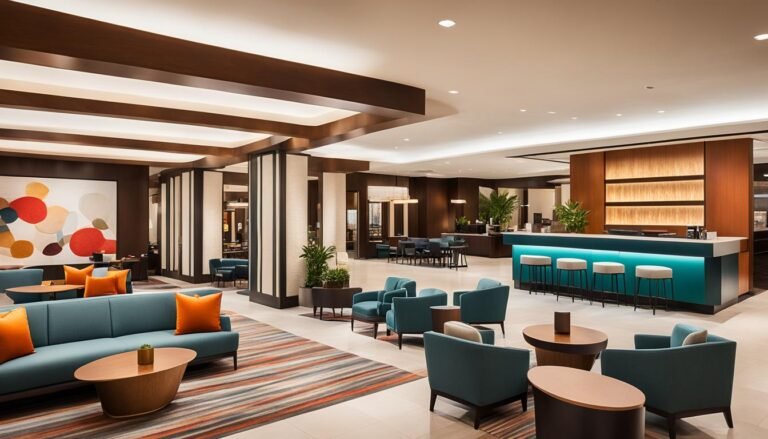Navigating Cultural Diversity in Hospitality Industry
Welcome to the world of hospitality. It’s a place where people from all over come together. They work to make unforgettable experiences for their guests. In this field, dealing with many cultures is crucial. Here’s a story to show why welcoming diversity is essential.
Sophia is a dedicated hotel manager who knows how important cultural diversity is. Once, her team struggled to talk with international guests. This led to problems and unhappiness for everyone.
So, Sophia took action. She made sure her team got training on how to communicate better across cultures. With the right skills, they learned to offer great service to all customers.
Thanks to Sophia’s efforts, the hotel saw an increase in happy guests and good reviews. Everybody felt welcomed and understood. This led to more business and good recommendations.
This story proves that being open to cultural differences helps the hospitality industry a lot. Having a diverse team can bring in fresh ideas and better ways to work. It also improves a business’s image in the market.
In the next parts, we’ll dive into why understanding cultural diversity is crucial in the hospitality world. We’ll see the gains, hurdles, and ways to manage diversity well. We’ll also check out how diversity can boost a company’s image and draw in more customers and great talent.
Key Takeaways:
- Managing cultural diversity is crucial in the hospitality industry to create inclusive and welcoming environments for both employees and guests.
- Diverse perspectives from a multicultural workforce can lead to innovative ideas and better decision-making.
- Cultural sensitivity and cross-cultural communication skills are essential in providing exceptional service and understanding the needs of diverse customers.
- Promoting diversity in hospitality leadership fosters inclusivity and equal opportunities for career advancement.
- Embracing cultural diversity enhances a company’s reputation and attracts customers and talented employees.
Understanding Cultural Diversity in the Hospitality Industry
Cultural diversity in the hospitality industry means having people from varied ethnic or cultural groups. As the world keeps opening up, more people from around the globe join the industry. This mix offers great chances but also poses some hurdles that need careful navigation.
A diverse workforce adds different viewpoints and skills. Employees with unique backgrounds bring new ideas and creative solutions. They also relate better to a varied customer base, understanding their specific needs.
“Cultural diversity allows for a richer and more inclusive hospitality experience, where guests feel valued and understood, leading to increased customer satisfaction and loyalty.”
Yet, this blend of cultures can lead to issues. Sometimes, diverse teams face difficulties due to differing cultural norms. These can cause communication challenges. It’s critical for companies to teach their teams to bridge these gaps for smooth operations.
Understanding and welcoming cultural diversity is key. This approach fosters a friendly, inclusive atmosphere for everyone. In the end, it elevates service quality, boosts employee morale, and enhances the business’s standing in its field.
The Benefits of Cultural Diversity in Hospitality
Having a diverse team benefits a lot more than just the company. It leads to a rich mix of ideas, improving how well the team performs and innovates. Studies show that diverse teams are more creative and effective at problem-solving, which is great for business.
A diverse team also connects better with customers from various backgrounds. This can skyrocket customer satisfaction, fostering loyalty and positive recommendations. The company better understands and meets the unique needs of each guest.
Moreover, diversity fosters adaptability. In a changing field like hospitality, being able to evolve is crucial. Diverse teams can quickly pick up new trends and respond to the market. This helps stay ahead in the industry.
Lastly, pushing for diversity and inclusion boosts your company’s public image. In today’s world, a business that welcomes all is seen as forward-thinking. This attracts customers and top talent, giving you an edge over rivals.
Cultural Differences in Hospitality: Managing Challenges
The hospitality industry’s diversity also poses unique challenges. A big one is the lack of diverse leaders at the top. While the workforce is varied, leadership often lacks representation. Including leaders from different backgrounds can enrich decision-making and promote fairness.
Also, there’s not enough data on diversity within the industry. Without this data, it’s hard to know if diversity efforts are effective. Studying the makeup of your team and customers helps build better, more focused strategies for inclusion.
Meeting the needs of such a varied customer base can be tough. Businesses must tailor their offerings to suit different cultures and practices. This demands a deep knowledge of world cultures and a commitment to thoughtful, personalized service.
“Successful management of cultural diversity in the hospitality industry calls for a commitment to continuous learning, open-mindedness, and creating an inclusive and respectful work environment for all employees.”
By tackling these challenges, hospitality businesses can build a harmonious, inclusive space. Embracing diversity enhances both the workplace and the bottom line. It leads to success and growth, making the company stand out in a crowded market.
| Cultural Diversity in the Hospitality Industry | Workforce Diversity | Customer Diversity | Cultural Differences in Hospitality |
|---|---|---|---|
| Presence of people from different ethnic or cultural groups | Strengths and perspectives of a diverse workforce | Meeting the diverse needs and preferences of customers | Challenges in communication and understanding |
| Opportunities and challenges that need management | Improved performance and innovation | Better service and customer satisfaction | Lack of representation and limited data |
| Adaptability and response to industry changes | Enhanced reputation and attraction of customers and employees | Catering to diverse customer preferences |
Benefits of Cultural Diversity in Hospitality
Cultural diversity boosts the hospitality industry in many ways. It’s not just about having diverse employees and customers. It brings fresh viewpoints, innovative ideas, and smarter decisions.
Cultural variety makes teams perform better. Skills and knowledge from different cultures mix. This mix boosts creativity and problem-solving, making teams work more efficiently.
“Diversity is the catalyst for creativity, innovation, and better decision-making.” – Stefan Schreiber, CEO of a leading hotel chain
A diverse team can offer better services. It understands a wide range of customer needs. Also, speaking multiple languages helps in clear communication and improves the customer’s experience.
Diversified teams are more flexible in a changing market. With constant changes and demands, being able to adapt is key. Different cultural perspectives bring fresh ideas to solve problems efficiently.
Embracing diversity benefits a company’s image. Today, both customers and workers look for inclusive places. Showing that your company values cultural diversity attracts both groups. They want to be part of a welcoming, diverse community.
| Benefit | Description |
|---|---|
| Diverse Perspectives | Employees with varied backgrounds provide unique insights and fresh ideas. |
| Improved Performance | A diverse workforce enhances creativity, problem-solving, and overall efficiency. |
| Enhanced Service | Catering to the needs of diverse customers fosters personalized guest experiences. |
| Adaptability | Diverse teams bring varying approaches and problem-solving techniques, aiding in navigating industry changes. |
| Company Reputation | Promoting diversity enhances brand image and attracts customers and talented employees who value inclusion. |
By fully embracing cultural diversity, the hospitality industry can grow and succeed. Creating inclusive, vibrant environments supports business success.
Challenges in Managing Cultural Diversity in Hospitality
The hospitality industry is a melting pot with a varied workforce and clientele. However, it struggles with handling cultural diversity. This is due to a lack of diverse leaders in high positions. Also, there’s little data on cultural diversity. Plus, businesses often miss the mark on serving the unique needs of diverse customers. Finally, marketing doesn’t always represent these groups.
At the top, few leaders come from diverse backgrounds. This limits new ideas and growth potential. To thrive, businesses need to welcome diversity in leadership. This encourages innovation and inclusivity.
One big issue is the lack of detailed data on cultural diversity. This data helps companies to tailor their approach. They get to know customers’ and employees’ needs better. It guides efforts towards better serving and engaging with diverse groups.
Meeting various cultural needs of customers is key but also difficult. Businesses must offer services that respect different backgrounds. This ensures everyone feels at home and happy with their experience.
Marketing often falls short in representing diverse customers. Businesses struggle to reach across cultures in their ads. Including diverse faces and stories in marketing can bridge this gap.
The answer to these challenges lies in embracing diversity. This includes actions like setting up inclusive policies and offering training. Such efforts create a welcoming atmosphere. They make sure every person, regardless of background, feels part of the hospitality world.
Building a Diverse Team in Hospitality
Creating a diverse team is key to an inclusive hospitality environment. It’s more than just hiring from various cultures. It needs leaders to be aware and to approach everything from recruitment to training in a broad way.
Leadership Awareness
Leaders are critical in forming a diverse team. They should spread the word about the benefits of having a mix of cultures. This sets the stage for everyone to value and understand each other’s backgrounds.
Recruitment Practices
To get a diverse team, focus on your recruitment methods. Actively look for a mix of candidates through special events and partnerships. Using job posts that welcome everyone also helps bring in diverse applicants.
Effective Communication
Good communication is vital with a diverse team. Creating a setting where it’s safe to share thoughts leads to better teamwork. Listening without judgment and being open to others’ views shows you value them.
Feedback and Training
Feedback and training are key for an inclusive workplace. Teach employees about different cultures to understand and support each other. Feedback should focus on development, helping team members grow and do better.
Celebrating Diversity
“Diversity is about all of us and about us having to figure out how to walk through this world together” – Jacqueline Woodson
Showing your team’s diverse backgrounds is important. Events and activities can help everyone appreciate each other’s cultures. This makes it clear that the company cares about and respects diversity.
Building diversity takes effort from everyone, from leaders to every team member. By focusing on inclusivity, hospitality places can really fuel the potential of their teams. This leads to a dynamic and varied workplace.
Managing Cultural Diversity in Customer Interactions
It’s important for hospitality businesses to manage cultural diversity in customer interactions well. They often serve customers from many cultural backgrounds. Understanding and meeting their needs is essential.
Employees need good cross-cultural communication skills. This helps avoid misunderstandings due to language or culture. It makes customers feel welcome and increases satisfaction.
“Our commitment to cultural sensitivity ensures that every guest feels valued and understood.”
It’s crucial for businesses to adapt services for various cultural needs. They should know and respect different customs. This makes the guest experience better and helps stand out globally.
Cultural sensitivity training is key for employees. It teaches them to understand and meet diverse needs. This leads to excellent service for all customers.
“Our cultural sensitivity training empowers our employees to provide exceptional service to customers from diverse cultural backgrounds.”
Embracing cultural diversity helps businesses connect better with their customers. It builds loyalty and positive feedback. Overall, this leads to a better business reputation and long-term success.
Case Study: The Ritz-Carlton
The Ritz-Carlton values managing cultural diversity in service. They aim to offer exceptional service to all guests. This includes understanding and respecting their cultural differences.
Extensive training at The Ritz-Carlton provides employees with the right communication skills. This helps them offer great experiences to guests of all cultures.
The hotel also integrates cultural elements into its services. This includes personal greetings and help with language. Such efforts show deep respect and make stays memorable for guests.
Promoting Diversity in Hospitality Leadership

Promoting diversity in hospitality leadership matters a lot. It helps make the industry more welcoming and varied. This goal is reached by putting diversity-promoting plans in place. It involves welcoming leadership that is inclusive to all.
Leaders have a big role in making the team diverse. They should actively look for people with different stories and backgrounds. Having a mix of perspectives and experiences improves how decisions are made. It also makes the workplace more open to everyone.
To level the playing field for everyone’s career growth, leaders are also key. They should offer chances for everyone to move up by giving training and support. This helps less represented groups get into leadership roles. Plus, it makes leadership in the industry more varied.
Inclusive leadership is all about making everyone on the team feel valued and heard. Leaders must keep the doors of communication open. They should encourage everyone to work together. By valuing what every individual brings to the table, the workplace becomes more innovative and inclusive.
Setting up task forces or groups can also boost diversity efforts. These groups work to find and break strongholds against diversity. Everyone in the organization gets a chance to play a role in making space for all. This way, a feeling of shared responsibility for inclusion grows.
Adding more diverse leaders to hospitality is key in making it more open and fair. By supporting diversity and inclusive leadership, organizations stand out as leaders in diversity. This draws top talents and makes the workplace a rich tapestry of various views and experiences.
| Benefits of Promoting Diversity in Hospitality Leadership | Challenges in Promoting Diversity in Hospitality Leadership |
|---|---|
|
|
The Role of Diversity and Inclusion in Hospitality Reputation
Today, a positive brand reputation is crucial for the hospitality industry. It draws in both customers and employees alike. Diversity and inclusion play a major role here. Entities that highlight such initiatives are seen as socially involved. They hence attract more business and talent.
Hospitality businesses have more to offer than great service. They strive to create a place everyone can thrive in, regardless of background. This improves how their brand is seen and gives them an edge over rivals.
“Diversity and inclusion are not just about ticking boxes; they are integral to building a strong, sustainable brand. Customers resonate with businesses that value diversity and inclusion, and employees are more likely to choose companies that foster an inclusive work environment.” – David Johnson, CEO of Hospitality Excellence
When customers notice a focus on diversity and inclusion, they are more likely to trust and connect with the business. They see it as a welcoming place where everyone is important, leading to loyalty.
These same efforts help attract and keep good employees too. People want to work for places that truly care about all individuals. This approach leads to a more talented and dedicated workforce.
Hospitality brands can show their commitment through community support and updated policies. This not only boosts their image but also positively impacts society.
The Benefits of Diversity and Inclusion in Hospitality Reputation:
- Enhanced brand image and reputation
- Attracting a diverse customer base
- Increased customer loyalty and advocacy
- Improved employee recruitment and retention
- Boosted performance and innovation
| BENEFITS | DESCRIPTION |
|---|---|
| Enhanced brand image and reputation | By fostering diversity and inclusion, hospitality businesses create a positive brand reputation and differentiate themselves from competitors. |
| Attracting a diverse customer base | Customers are more likely to choose brands that they feel represent and value their diverse backgrounds and preferences. |
| Increased customer loyalty and advocacy | When customers have positive experiences with inclusive hospitality brands, they become loyal advocates, leading to repeat business and positive word-of-mouth. |
| Improved employee recruitment and retention | Prioritizing diversity and inclusion attracts top talent and fosters a positive work environment, resulting in higher employee satisfaction and retention rates. |
| Boosted performance and innovation | Diverse teams bring a variety of perspectives and ideas, leading to better problem-solving, innovative solutions, and improved business performance. |
Summing up, diversity and inclusion matter greatly in the hospitality sector. They help businesses reach wider audiences, improve customer experiences, and build exceptional teams. By opening their doors to everyone, brands boost not just their own standing but also contribute to a fairer society.
The Impact of Diversity in Hospitality Marketing
Diversity is key in making hospitality marketing work well. Showing various customers in ads helps every kind of person feel seen. This can hook more folks and make them like your brand more. Ads that target different groups can bring in new customers and keep the ones you have.
“Diversity is not about how we differ. Diversity is about embracing one another’s uniqueness.” – Ola Joseph
Importance of Diverse Customer Representation
It’s vital for hotels and restaurants to show lots of different people in their ads. This lets customers know they’re welcome. When ads include folks from many backgrounds, people see your brand as open and friendly.
It also tells a story about your company. It says you care about everyone and treat them equally. This wins hearts and builds a loyal customer base.
Targeted Marketing for Diverse Audiences
Targeted marketing is how you speak directly to specific groups. This type of advertising makes people feel like you really get them, which builds trust. So, it’s crucial to know what different people like and want.
Good research and using data are necessary for successful targeted ads. They help you understand your customers better. Then, you can create ads that truly connect with them.
Maximizing Connection Through Diversity
Showcasing diverse stories makes a strong bond with your audience. People love seeing brands that reflect the real world. It shows you value everyone. That builds good will and loyalty.
- Use diverse images: Include people from all walks of life in your ads to show everyone is welcome.
- Tell unique stories: Share tales from different cultures to make a personal connection with your audience.
- Celebrate different cultures: Recognizing cultural events and holidays shows you care and strengthens your bond with many.
Using diversity in your ads makes your brand more sincere. It attracts new clients and keeps the ones you have. It’s not just about more sales; it’s also about creating a community with your clients.
| Benefits of Diversity in Hospitality Marketing | Strategies for Targeted Marketing |
|---|---|
| 1. Increased brand authenticity and relatability | 1. Conduct thorough market research |
| 2. Expanded customer base and market reach | 2. Tailor messaging to specific cultural groups |
| 3. Enhanced brand reputation and loyalty | 3. Leverage data analytics for insights |
| 4. Fostered sense of inclusivity and belonging | 4. Develop culturally relevant content |
The effects of diversity in marketing are clear. By investing in different customer ads and targeted marketing, businesses can grow. It’s not just good for society; it’s a smart business move.
Conclusion
Managing cultural diversity is key for hospitality businesses to flourish in our connected world. It offers many upsides for their growth.
A mix of people in the team and among customers brings varied viewpoints and ideas. This can boost performance and the quality of the service. Also, having a diverse leadership helps the industry seem more friendly and appealing.
Yet, there are hurdles in working with cultural diversity. For example, there aren’t many diverse voices in top positions. Also, we don’t have enough information on how diverse the industry is. We must tackle these issues.
By making diversity a top priority and creating inclusive environments, hospitality businesses can be more welcoming. This benefits both their staff and their customers.
To sum up, handling cultural diversity well in hospitality brings a win-win for everyone. It lets businesses get the best from diversity while facing challenges head-on. This, in turn, helps them stand out in their field.
FAQ
Q: What is cultural diversity in the hospitality industry?
A: This refers to having people from many different ethnic backgrounds in the industry. They work together and share their unique cultures.
Q: What are the benefits of cultural diversity in hospitality?
A: Having a mix of cultures boosts performance and service quality. It also makes the company more adaptable. This leads to a good image.
Q: What are the challenges in managing cultural diversity in hospitality?
A: It can be hard to make sure all cultures have a say in decision-making. There might be a lack of data on diversity too. Selling to diverse groups and marketing fairly is a challenge.
Q: How can I build a diverse team in the hospitality industry?
A: Leaders need to see the value of diversity. Recruit in a way that aims for varied backgrounds. Also, train and support your team to celebrate differences.
Q: How can I manage cultural diversity in customer interactions?
A: It involves understanding different cultures and needs. Train your staff to be sensitive and communicate well with all customers. This can make service better.
Q: How can I promote diversity in hospitality leadership?
A: Start by encouraging various voices and looking for diversity in your teams. Treat everyone fairly and give equal chances for growth. These actions lead to a stronger and more united team.
Q: What is the impact of diversity and inclusion on a hospitality business’s reputation?
A: Companies that are diverse and inclusive are often seen as good by society. This makes them attractive to customers and talented workers.
Q: How does diversity play a role in hospitality marketing?
A: Show your diverse audience in your ads. Tailor your marketing to different cultures. This helps create a bond with your audience more easily.
Q: How can managing cultural diversity benefit hospitality businesses?
A: It leads to better service and performance. Your company’s image improves too. Most importantly, it creates a welcoming place for everyone.







